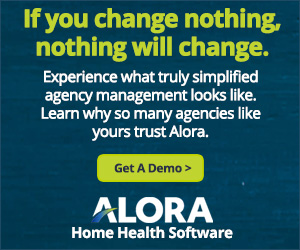
22 Feb Maintaining Medicare Certification for Home Health Agencies
A quick guide to support continued agency compliance
Reaching status as an accredited provider in the Centers for Medicare and Medicaid Systems (CMS) program as a home health agency is a sizable milestone to achieve. Equally as difficult is maintaining Medicare certification by meeting or exceeding the rules and regulations of the industry through survey by Medicare approved accrediting organizations.
The list of federal, state, and local requirements to maintain Medicare certification spans hundreds of pages. Below are some vital tips to avoid deficiencies for noncompliance and ensure quality patient care.
Know the Conditions
CMS has readily available on its webpage the various Conditions of Participation (CoPs) and Conditions for Coverage (CFCs) that must be specifically followed to maintain certification. Developing policies and procedures aligned with the home health guidelines will best suit agencies to comply with regulations.
Make time for regular review of Medicare updates. Subsequently, update the agency policy to reflect the most current standards. In most cases, assigning a specific person or group to this task is beneficial as they become more specialized in this role.
Some accredited organizations by CMS to perform surveys provide support to home health agencies. Navigating the detailed language in the CoPs alone can be overwhelming. Get help drilling down the regulations to understandable definitions as they apply specifically to the agency. It may also be valuable to hire a compliance consultant.
Internal Review
Performing routine deep dives into patient charts gives valuable insight into potential areas of concern. Breaking down the task of internal chart auditing into more bite-sized focus areas per quarter can make the task a bit more workable for the agency.
Medicare-approved accrediting organization Community Health Accreditation Partner (CHAP) suggests reviewing several sections during audits to avoid common home health deficiencies. These include:
- The individualized plan of care for accuracy of items such as spelling of names, allergies, medications, and reasons for taking medications. This task is most helpful when performed before submission for a provider’s signature.
- Communications made during changes in patient condition, focusing on the timeliness of appropriate provider notification and update(s) to the plan of care as necessary.
Staff Education
Staff need to be educated on competency expectations, and the reasons for their regulated workflow to improve compliance. To maintain CMS compliance, exceptional care, and competency is expected, nonetheless. A thriving competency program within home health agencies is the cornerstone to satisfy the expected level of care for patients.
Home health agencies must not only provide current clinical practice to patients but maintain standards of care and also detail the competency of any employed home health aides. Accrediting organizations evaluate regulatory compliance in a variety of ways, but there are central themes foundational to all: Care that demonstrates Attributes to deliver safe, quality care.
To support compliance with Medicare competency guidelines, it can be suggested to:
- Host regular in-services on topics frequently encountered in the home such as infection control practices (hand hygiene, bag technique, use of dedicated equipment, etc.).
- Maintain competency records of aides.
- Provide learning modules concerning frequently missed audit items to focus on problematic areas. Gain staff feedback on processes for improvement.
Supervisory Visits
Regular visits to monitor care provided can allow home health agencies to identify areas of improvement prior to survey that may not be obvious from audits performed behind a desk. Supervising staff in homes can also help instill a feeling of dedication to quality care from the agency to patients and their loved ones. Suggestions for in-home supervisory visits include:
- Supervising compliance frequently for compliance to commonly cited deficiencies such as infection control and following the plan of care.
- Co-visits during comprehensive assessment visits to validate competence, ensure medications are reviewed and reconciled, and patients are informed of their Bill of Rights.
- Follow up on concerns during audit findings and more immediate for patient complaints.
Systems
Having the right systems to work for the home health agency will be worth their weight in gold. Take a deep look at the way in which the agency utilizes system operations for the complexities of all moving parts to make compliance easier. Evaluate if the system is an easy-to-use home health software platform with the potential to integrate ways to avoid common deficiencies. Identifying ways in which systems can improve compliance include the ability to seamlessly:
- Document Electronic Visit Verification data to comply with the visit schedule.
- Alert for patient emergency room visits or hospitalizations to easily identify if providers were informed and the plan of care updated in the appropriate time frame.
- Alert for current or new patient infections to ensure communication is made to frontline staff for necessary infection control practices.
- Validate visits to orders, to ensure staff are following the individualized plan of care.
Home health agencies must align their operations with many detailed rules and regulations. There are many administrative challenges to being survey-ready in order to maintain Medicare compliance, yet there are home health support communities available to reference for growing a thriving, complying home health agency.
Author’s Note: Views, information, and guidance in this resource are intended for information only. We are not rendering legal, financial, accounting, medical, or other professional advice. Alora disclaims any liability to any third party and cannot make any guarantee related to the content.
Helpful links:
Agency Compliance Archives – Alora Health
Education | Community Health Accreditation Partner (chapinc.org)
Common home health deficiencies
Attributes to deliver safe, quality care
Conditions of Participation (CoPs) and Conditions for Coverage (CfCs)
Other related blogs:
CMS Survey preparation for home health agencies
Maximizing Payments Under the Expanded HHVBP Model

Alora’s home health software solution is ideal for agencies operating in both skilled and non-skilled care. When it comes to Medicare certified agency compliance, Alora offers an award winning solution that simplifies administrative processes and has features in place that align with regulatory best practices, all while making patient care a thing of joy. When everything you need for every aspect of home health care is in one place, compliance is simplified allowing agencies to grow and thrive.



No Comments